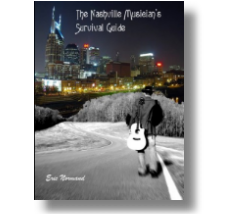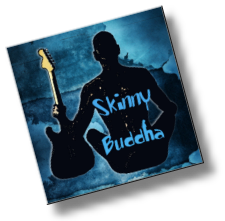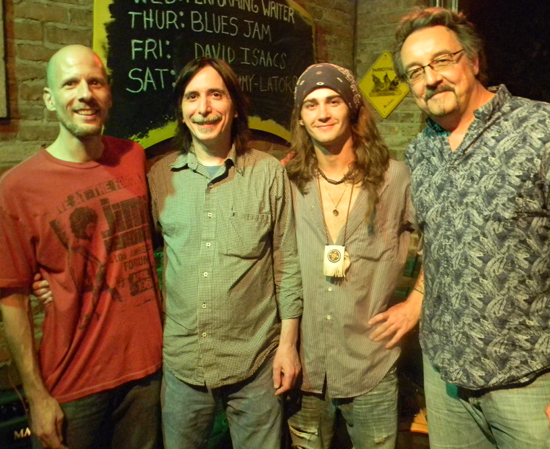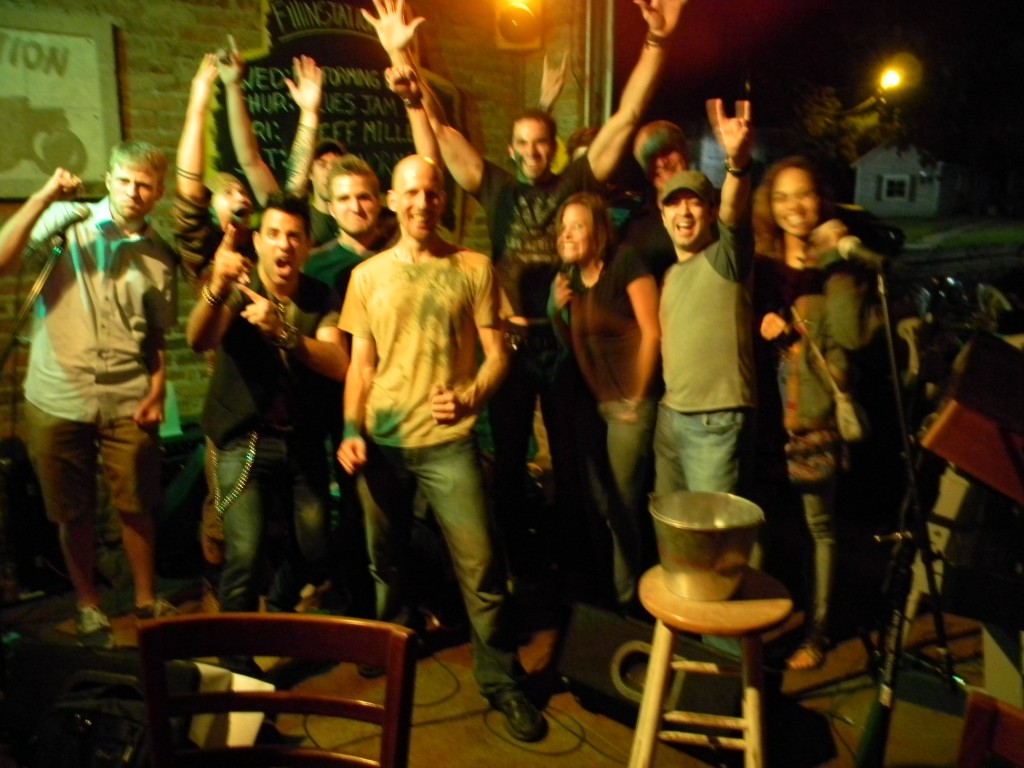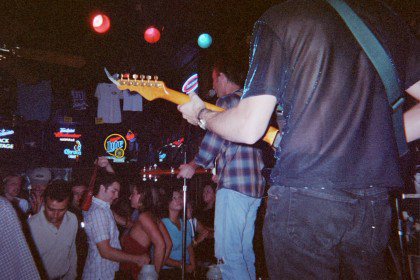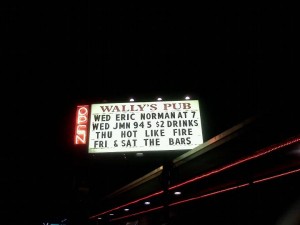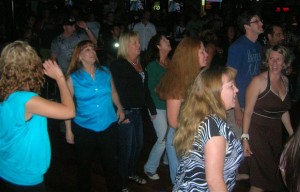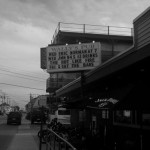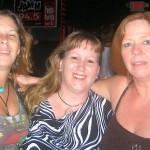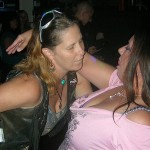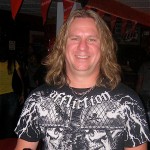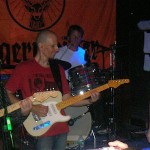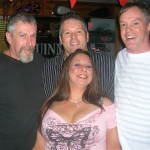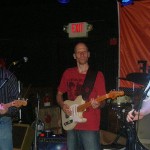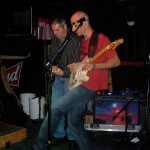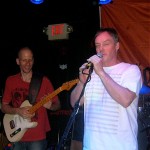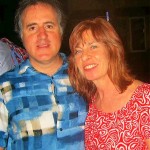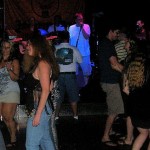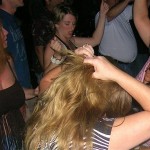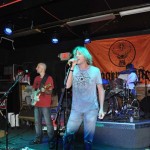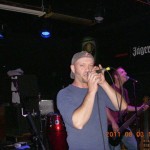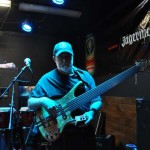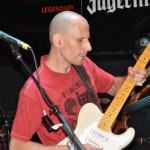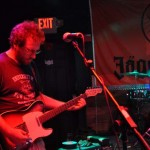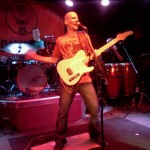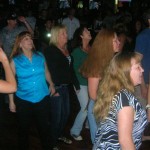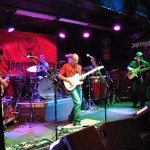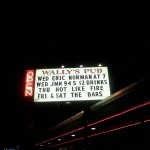
Guitarist, singer, songwriter, producer and session-musician, Jack Pearson shared some unique perspective about his musical journey with a room full of Berklee alumni and others from the Nashville music community last Tuesday. The Nashville Berklee Jam, held monthly at the Fillin’ Station in Kingston Springs, saw some new faces and old friends on this special night, and Jack’s decades of experience as a world-class musician provided a rare peek behind the curtain for all those in attendance.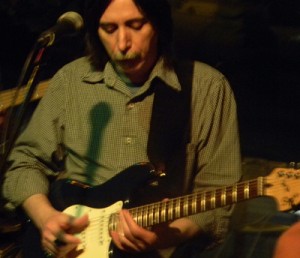
Jack’s musical career began in the mid 1970’s, when he played in multiple bands and logged his first recording session at age 16. In 1993 the Nashville native began his relationship with The Allman Brothers Band as a sub for Dickey Betts, eventually becoming a member of the ABB from 1997-1999 and also touring with Gregg Allman & Friends. Over the years he’s also worked with Vince Gill, Delbert McClinton, Jimmy Buffett, Earl Scruggs, Bobby “Blue” Bland, Amy Grant, Faith Hill, Gov’t Mule, Buddy DeFranco, and countless others.
Jack began his part of this night by playing some beautiful sketches of “I Can’t Get Started”, and for those who have never heard him play, his ability to transport an audience through time and space with nothing other than an unaccompanied electric guitar became quickly apparent. Following the spontaneous applause, Jack cut straight to some Q & A. One of the first questions asked was about his guitar, and I found it interesting that the deep, rich tone coming out of our backline Fender Deluxe originated from a Fender “Squire” Stratocaster, which he had recently bought for $100 at a pawn shop. Plugged into nothing other than a lone tube screamer, this drove home the point that great tone comes from within.
Learning from his oldest brother, Jack was exposed to rockabilly and blues as a teenager and explored the music of Chuck Berry, The Ventures, and Carl Perkins at a young age before eventually discovering jazz greats like, Wes Montgomery, Django Reinhardt, and Charlie Christian. Learning from friends, other musicians, and records, he slowly pieced together his musical vocabulary. He shared some thoughts on how to approach a II-V turnaround, demonstrating some different voicings and melodic approaches, underscoring the importance of putting song and melody above the technical understanding of modes and scales.
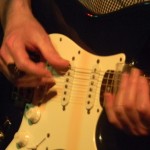 “It takes a lot of experimenting… a lot of guys come to me that get out of school and they say, “when I hear this chord I’m supposed to play this mode and scale”, and it locks them up. They can’t make any melodies because they’re told to play a mode or a scale.”
“It takes a lot of experimenting… a lot of guys come to me that get out of school and they say, “when I hear this chord I’m supposed to play this mode and scale”, and it locks them up. They can’t make any melodies because they’re told to play a mode or a scale.”
This simple, but prophetic thought resonated, and I had flashes to a time in my life when I over analyzed the music I played. Jack drove this point home with “…it comes down to the chord and the melody and where it’s going to…”
He went on to talk about the blending of styles and how he went through different periods of his life where he would be deeply immersed in a singular style for a few years – Delta blues, jazz, etc., and that after a while, all these different styles started coming together. Not afraid to take some chances musically, he demonstrated how he might go from a Howlin’ Wolf lick to a Charlie Parker lick within the same phrase, and that while some players will say this is wrong, he believes that “the main thing is to get the music out, and play with feeling.”
In response to a question about some of his best and worst gigs, Jack said that some of the worst gigs are when people don’t listen, and the music that you play with somebody is more important than the venue, or how famous somebody is.
He explained how learning all of the Allman Brothers songs as a kid helped put him in the position to sub for Dickey Betts on an early 90s Allman Brothers tour, which led to some recording with Gregg Allman and eventually to a phone call from Greg in which he was asked if he wanted to join the Allman Brothers band.
He candidly shared how this landmark gig damaged his hearing, causing an already existing case of Tinnitus to worsen, ultimately forcing him to leave the gig, perhaps sooner than he otherwise would have.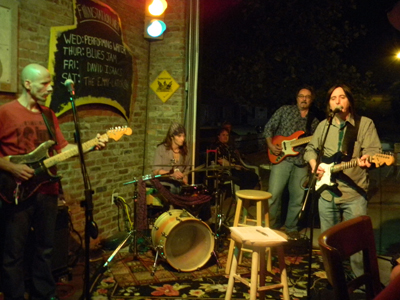
“There’s really no way to describe how loud it was on stage…Dickey Betts wasn’t in the PA…he was 135 dB side stage…”
As a fellow tinnitus sufferer I completely related to this portion of his talk and gained some new perspective as he explained that, despite wearing earplugs, extreme SPL’s (sound pressure levels) can still do damage, as the sound can affect your inner ear by entering your nose, mouth, and through your bones.
In response to a question about life lessons learned through music he answered, “Try not to take music for granted, it’s so special, and you can reach so many people…lyrics can encourage you, relate to your pain, but you can also do it with notes.” He demonstrated this by showing how the same group of notes can sound happy, or sad depending on where the emphasis is placed. He talked about the endless possibilities of how you can play even a single note, demonstrating this concept by playing a huge range of variances on a high “G” note.
After Jack’s talk concluded he played a short set with our Alumni House Band, the air becoming filled with the sounds of spontaneous applause after each inspired performance. Jack left shortly after his set, and the other alums in attendance continued jamming into the night. I, and everyone else in attendance would like to extend our appreciation and gratitude to Jack for sharing his music and journey on this special night!
Our next Nashville Berklee Jam will feature country music artist and hit-songwriter, Rhett Akins on Tuesday, September 11 at The Fillin’ Station. For more info, go to www.nashvilleberkleejam.com.
Today I want to tell you all about an exciting monthly event I have been hosting – The Nashville Berklee Jam, and its new accessibility to everyone in the Nashville music community. The beginnings of this idea came to me a few years ago when I first attended the annual Nashville Berklee Alumni Reception. On my way home that night, I remember thinking how great it was to meet so many musicians in one night who were so passionate about their musical ambitions and so hungry for knowledge. These musical comrades were a mix of Berklee alumni residing in middle Tennessee and Berklee students who came down for the annual Nashville field trip. At this reception I made connections with other like-minded alums and students who came down on the field trip, the latter peppering me with questions about my experiences in Music City. This event was a very stimulating night as the energy of three hundred musical minds meeting and conversing seemed to create an air of camaraderie and untapped potential! Then I went home and another year passed before I got this fix again.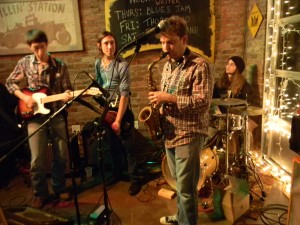
So this past winter I decided to create a monthly event to try to emulate this musical networking hoedown on a smaller scale, and The Nashville Berklee Jam was born. Held on the first or second Tuesday of the month from 7 PM to 11 PM at The Fillin’ Station in Kingston Springs, TN, these events start out with an informal meet and greet, followed by a Nashville music industry guest speaker, and end with an open jam. So far the reception has been very positive, here’s a recap (with links to their corresponding blogs):
February – A-list session bassist, Mike Chapman gave a great talk about being a session musician, outlining key concepts in what he calls, “the essential slices of the session player pizza”. He also jammed with several alums after the talk.
March – award-winning vocal coach, producer, and hit songwriter, Judy Rodman gave an insightful talk about career paths for vocalists. She also performed a couple of songs with the house band and then critiqued and coached several vocal performances, helping vocalists make instant improvements.
April – Stevie Ray Vaughan keyboardist, Reese Wynans shared his fascinating story about being a lifelong-career musician, the life-changing moment that came on his last night with Delbert McClinton that landed him the SRV gig, and the whirlwind years that followed. After his talk, he joined us for a few inspired performances.
May – fellow alum, musician, and author of “The Nashville Number System”, Chas Williams gave an introductory class on this subject. After the class, he charted one of alum, Sarah Tollerson’s originals and performed it with Sarah and the house band with everybody reading the chart off a dry erase board.
June – drummer, producer, and clinician, Rich Redmond gave an inspiring talk on “Navigating the Nashville Music Industry” speaking candidly about his early “lean years” in Music City and different approaches to finding success here. After his talk he sat in for a few tunes and stuck around to chat with others in attendance.
For our next event, to be held on Tuesday, July 10, I will be giving a talk that continues last month’s theme – “Navigating the Nashville Music Industry – Part Two”, during which I will explore some of the concepts I write about in my book “The Nashville Musician’s Survival Guide”. And, this just in, for our event in August we are proud to announce that the guest speaker/performer will be none other than Nashville guitar ace, Jack Pearson, formerly of the Allman Brothers, Vince Gill and many others.
All of the guest speakers have given great talks, sharing their knowledge and providing inspiration, and these talks have been interactive with many great questions and comments from alums. My band, Skinny Buddha (comprised of Berklee alumni and others from the Nashville music community) provides backline and a starting point for the laid back jams which have covered everything from originals to classic rock to blues tunes to two-chord jams. All of these events have been great friendship building and networking experiences for all involved, as well as educational. So far, the attendance has been mostly comprised of Berklee alumni, but as there seems to be a growing interest from others in Nashville, we are now officially making this event open to the Public. Nashville is a diverse and complex music community in which a Berklee alumni community also resides, and it is my goal to help these two worlds intersect and meld together.
So come on out to our next “Nashville Berklee Jam” On Tuesday, July 10. I hope to see you there!
P.S. if you have any comments, thoughts, or questions, please feel free to e-mail me at eric@ericnormand.com.
The latest Nashville Berklee Jam last Tuesday was a great success, thanks to all who attended! The weather was beautiful, so we had a very laid back talk outside on the patio at The Fillin’ Station, our usual location for this event. Rich Redmond, the guest speaker on this night, has worn a lot of hats during his 15 years in Nashville – session/touring drummer, producer, clinician, public speaker, and his hour-long talk gave all in attendance some great perspective into different ways to navigate the Nashville music industry.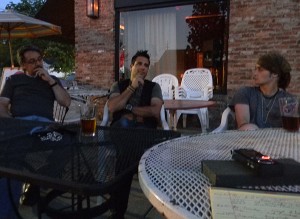
Rich spoke of the need to aggressively market yourself to find work in Nashville and how in his earliest days he obtained work by handing out demo cds of his drumming abilities to almost everyone he would meet around town. He candidly talked about those ‘lean years’, and that long before he was recording on hit records, touring the world with Jason Aldean, and producing acts like ‘Thompson Square’, he was hustling gigs on Broadway, playing in corporate party bands – whatever was necessary to insure survival.
For those who are just starting out in Nashville, he recommended that musicians “take every gig that’s offered”, as every new gig can potentially lead to new relationships and different career opportunities and that “If you give more to people then they expect, if you consistently exceed expectations, people are going to want to work with you.”
He spoke of the need to be ultra-professional by “always returning phone calls in a timely manner, always returning e-mails in a timely manner, being professional, being flexible, having the right gear to do the job and never mailing in a performance…”
Regarding the importance of reputation he said “You can have a great website, you can Tweet 1000 times a day, you can have a fantastic business card that’s got the really good paper, you know the really firm stuff that you have to pay extra for, and it’s still going to come down to word-of-mouth. In this [digital] age it’s so easy to be talked about in a positive or negative way, globally.”
During one part of the talk he mentioned a concept he refers to as “CRASH” a phrase he coined that stands for Commitment, Relationships, Attitude, Skill and Hunger – the five key ingredients he believes are necessary to succeed. He also spoke of the importance of defining your own success, a concept I talk about in my book “The Nashville Musician’s Survival Guide” (coincidentally, Rich contributed to the writing of this book).
After fielding several questions, he finished his talk and we all headed inside to make some music. Everyone who wanted to jam got a chance to sit in, and several great performances took place – ranging from classic rock covers to blues jams to originals. Rich stayed till the end making himself accessible to anyone who wanted to hang and chat, and during the middle of the jam he got behind the drum kit and played a few songs with me and several other alums. Here’s an MP3 of us playing a spirited version of the Jimi Hendrix classic, ‘Little Wing’ Little Wing Berklee Jam w Rich Redmond low. The night ended and we all headed home, but not until gathering for a group photo.
I want to thank everybody who came out and participated to make this another great event, see you at the next one! The next Nashville Berklee Jam will be held on Tuesday, July 10 – check back in a few days for info on the guest speaker for that night.
Some of my earliest childhood memories are of my dad playing records and, dare I say, reel to reel tapes of the music of Paul Butterfield, John Lee Hooker, Santana, and Derek and the Dominoes. I guess this music made an impression, because by my early teens in the early 1980’s I was buying my own records, not of the pop-based FM radio music of my generation, but of the previous generations more blues-based artists. While everyone else was listening to E.L.O. and Michael Jackson, I was discovering Jimi Hendrix, the Allman Brothers, BB King and Bobby Bland. Sure, I liked some of the 80’s guitar rock of the day, but always kept digging back to a more rootsy sound. Then right smack in the middle of 80’s hair band mania came Stevie Ray Vaughan, and I immediately related to his music.
Stevie’s music influenced a generation of guitarists and, at a moment where rock and pop music was winding itself up, almost single-handedly brought blues music back into the light. You couldn’t go see a club band during the late 80’s and early 90’s without hearing his music. I found myself covering his renditions of blues classics like “The Sky Is Cryin’”, “Empty Arms”, as well as originals like “Cold Shot” and “Walkin’ the Tightrope”, as did many others at that time. Stevie’s instrumental “Riviera Paradise” from the album ‘In Step’ is a beautiful piece of American roots music, and I always loved the spooky vibe created by his magical band on that song in particular.
I’ll never forget the day I heard of his tragic passing, how sad it was that we had to lose such a wonderful artist at such a young age. But his music, and the influence of his music, lives on, and I, like many others, will always appreciate everything Stevie did for music, and everything his music has done for the world.
So that’s why when I began hosting the Nashville Berklee Jam I felt compelled to 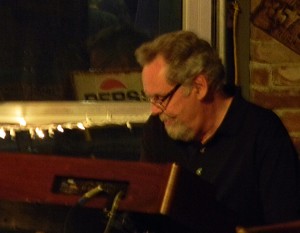 have Reese Wynans, the keyboardist who played with Stevie for the last five years of the great guitarist’s life, as a special guest speaker/performer. Reese was kind enough to share his story with me and a room full of alums at our monthly Nashville Berklee Jam last Tuesday at The Fillin’ Station.
have Reese Wynans, the keyboardist who played with Stevie for the last five years of the great guitarist’s life, as a special guest speaker/performer. Reese was kind enough to share his story with me and a room full of alums at our monthly Nashville Berklee Jam last Tuesday at The Fillin’ Station.
Almost 20 years before he began working with SRV he was playing in cover bands in his home state of Florida, and he recounted one of his first bands playing five sets a night, six nights a week. Two of the other members were Dickey Betts and Berry Oakley and on their one day off they would play a weekly free jam, adding Duane Allman and Butch Trucks to the mix. Eventually Duane decided to start his own band and stole these key members to form The Allman Brothers.
After spending a few years in San Francisco and working with a still-unknown artist at this time, Boz Scaggs, he returned to Florida for a brief period and then worked the East Coast in a show band for a few years. Reese then migrated to Austin, Texas, a booming town full of blues-infused music by this point of the mid-70s. Of this time, Reese spoke passionately.
“It was really great for me living in Austin…everything was so rootsy…they had a great music scene back there in the 70’s. They had a great blues scene, and a great blues club called ‘Antone’s’…and I would go and sit in at Antone’s anytime I had a chance. I was ending up really lovin’ the blues during this time.”
By 1980 he found himself working for Delbert McClinton, playing on four of his records and touring extensively for the next five years. By 1985, Reese was ready to get off the road, and would have if not for a fateful encounter at the end of his final gig with Delbert. Apparently, Delbert’s sax player had been invited to play on one song of a Stevie Ray Vaughan recording session after Delbert’s concert, and at the last minute Reese was asked to join in as the other keyboardist did not show up. Things went very well at this particular recording session, one which produced the hit, “Look at Little Sister” and Reese was asked to come back and record the following day. By the end of that recording session he was asked if he wanted to join the band. Reese summed up a life lesson from this critical moment,
“When a door opens for you, you’ve got to be willing to walk through it, and then be able to deliver once you get through there.”
The next five years would yield three Grammys, several world tours, and a reintroduction of the blues to the masses –
“We were spokesman for Texas blues…as much as Stevie didn’t want to, BB King had to open for us, because we were just more popular than him. He said “no we can never, BB’s always closing the show”… but finally, we had to headline…I loved playing in that band…we were all totally immersed in the blues, and we felt like were the vanguard of the blues. We were dragging Buddy Guy and Otis Rush into the light and presenting them out on our shows to people who were just hungry for that music…the stuff that we played I thought was shining a light on all the huge blues guitar players that had come before us, and that was a wonderful thing to do, I felt like it was really worthwhile.”
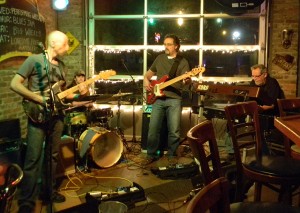 After Stevie’s tragic passing, Reese wound up in Nashville, TN, a place where he has continued to record and perform on a national level. During the talk, Reese passed around his All Music Discography, which reveals a staggering body of work, including Brooks and Dunn’s 2006 single of the year “Believe”. He offered us some thoughts about the differences between studio and live performance –
After Stevie’s tragic passing, Reese wound up in Nashville, TN, a place where he has continued to record and perform on a national level. During the talk, Reese passed around his All Music Discography, which reveals a staggering body of work, including Brooks and Dunn’s 2006 single of the year “Believe”. He offered us some thoughts about the differences between studio and live performance –
“I like being in the studio, I like playing gigs, I like playing clubs…all you people who do studio work know it’s two different things. Playing a club is really a chance to experiment…a chance to reach out in different directions and really find yourself. The studio isn’t really a place for that. The studio is where you don’t have to play it safe, but you’ve got to do something that’s exactly right for the 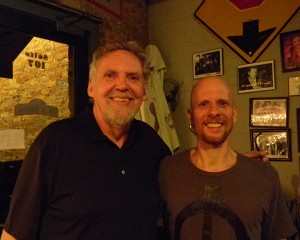 song…it’s a place for finding something that works, finding something unique that works.”
song…it’s a place for finding something that works, finding something unique that works.”
After his talk was finished, Reese was gracious enough to perform a set with our house band – a performance that was nothing short of inspired. I’ve heard his playing on many records, but there’s something intangible that you can feel in the heat of live performance that goes beyond a recording, and that was evident on this night. One of the songs we played together was “Little Wing”, a song that he had played on tour with Stevie, back in the day. On this song, Reese seemed to really stretch out in one of those magical musical moments in which time seems to stand still (see video below).
Eventually, this special night had to end, and we said goodbye after a quick photo op. Thanks, Reese, for sharing your wisdom, and for continuing to shine some light on that crown jewel of American music we call the blues.
Our second “Nashville Berklee Jam” at The Fillin’ Station in Kingston Springs this past Tuesday was a great success! The guest speaker on this night was none other than Nashville’s award-winning vocal coach, Judy Rodman. Judy has played many a role in the Nashville music industry 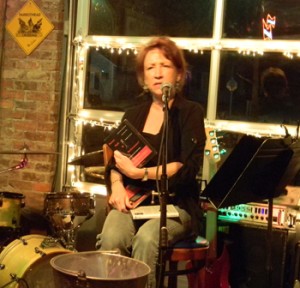 over the years – recording artist, A-list session singer, producer, hit songwriter – and on this night her talk focused on different career paths for vocalists. Judy was involved in the writing of my book “The Nashville Musician’s Survival Guide” and, backing up my theory of the necessity to “wear a lot of hats”, she talked about multiple streams of income for today’s musicians and artists. Among the potential jobs for vocalists she outlined were artists, live singers, and session singers (jingle singers, background vocals, demo singing, and voiceovers).
over the years – recording artist, A-list session singer, producer, hit songwriter – and on this night her talk focused on different career paths for vocalists. Judy was involved in the writing of my book “The Nashville Musician’s Survival Guide” and, backing up my theory of the necessity to “wear a lot of hats”, she talked about multiple streams of income for today’s musicians and artists. Among the potential jobs for vocalists she outlined were artists, live singers, and session singers (jingle singers, background vocals, demo singing, and voiceovers).
Here are a few excerpts:
“Recording artists need vocal ability, because the mark is up. Even with pitch fixing, rhythm fixing…your vocal needs to be as good as it possibly can be because it’s going to sound more natural and it’s going to be more emotionally compelling…You also need a ‘unique artist definition’…it’s not good enough to be just another great singer…you really need to be unique and find your own definition as an artist – your uniqueness, your vocal uniqueness – which means you need to explore your whole voice and your life experiences that you’re going to put into your art. The sound of your artistic definition is going to have to do with the sound of your voice, the choice of your instrumentation, and your message… Artistic definition takes exploration. For those of you wanting a career as a recording artist I would say don’t shortcut your experimentation.”
“For live background singing – you need to have the ability to trace and completely blend and go with the nuances of the voice of the singer you are looking to back…You’ve got to be able to change your sound as the artist wishes…you will of course have to have the ability to sing harmony parts and hear them… you have to have a specific look – whatever the artist is looking for. You need to network and find out who is gigging, who is in need of background vocalists.”
“Session singing…You need great vocal technique, usually you’ll need some vocal training…you really need to have surgical control of your voice for pitch, sound, blend and nuances –because time is money in the studio…You need to of course hear harmony parts quickly, you need to have the ability to read manuscript…but you also need to know the Nashville Number System.”
Judy then gave some practical vocal technique tips before answering several questions from alumni. Click on the following links if you would like to hear her talk in its entirety.
Judy Rodman Talk – Part One (21 min)Judy Rodman Talk – Part 1 (21 min)
Judy Rodman Talk – Part Two (21 min) Judy Rodman Talk – Part 2 (21 min)
There is also a ton of useful and practical information for vocalists at Judy’s website www.judyrodman.com.
When her talk concluded we began the jam portion of the evening with our house band backing Judy for two songs to start things out. Her second tune, “One Way Ticket”, was a number one hit she wrote that was cut by LeAnn Rimes. Judy’s vocal performance was emotionally 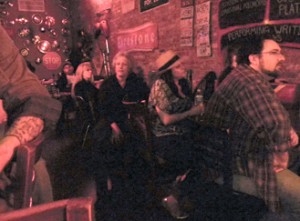 charged and inspiring to say the least, and this set the tone for the rest of the evening. A special dynamic on this night was the “optional vocal performance critique” that Judy offered for willing participants. To break the ice, I decided to go first and sang my two songs with the house band. After my first song, Judy pointed out some of the strengths about my performance and addressed a few things to work on.
charged and inspiring to say the least, and this set the tone for the rest of the evening. A special dynamic on this night was the “optional vocal performance critique” that Judy offered for willing participants. To break the ice, I decided to go first and sang my two songs with the house band. After my first song, Judy pointed out some of the strengths about my performance and addressed a few things to work on.
The jam continued with several great performances. Brian Lucas, the house keyboardist, sang a great rendition of “Georgia”, for which he took the vocal critique option. This pattern continued for the rest of the night, with literally every vocalist asking for a critique. Among these were Ted Schempp, the vocal duet “Acklen Park” (performing songs they co-wrote with alum, Shantell Ogden), Sarah Tollerson, and Michelle Lambert – all performing original 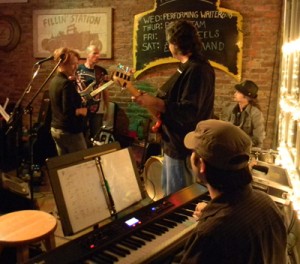 material. After the first song by each performer, Judy offered critiques and then we would try a part of the song again, seeing instant improvement in the vocals (don’t get me wrong, the vocal performances were pretty strong to begin with). Alums, Elton Charles on drums and Rick Carizales on guitar, also sat in and did a fine job backing up some of the guests. Brian Lucas made a big contribution by charting out many of the songs in advance, and Shantell helped out by taking photos and some great video excerpts (see below).
material. After the first song by each performer, Judy offered critiques and then we would try a part of the song again, seeing instant improvement in the vocals (don’t get me wrong, the vocal performances were pretty strong to begin with). Alums, Elton Charles on drums and Rick Carizales on guitar, also sat in and did a fine job backing up some of the guests. Brian Lucas made a big contribution by charting out many of the songs in advance, and Shantell helped out by taking photos and some great video excerpts (see below).
It really was a special evening, fun was had by all and I think everybody learned a few things too. I want to thank Judy Rodman, our house band (Heston Alley on drums, Tom Good on bass, Brian Lucas on keys) and all the alums who participated and helped make this a special evening, I can’t wait for the next one!
The next Nashville Berklee Jam will be held on Tuesday, April 10th at the Fillin’ Station with special guest, Reese Wynans, formerly of Stevie Ray Vaughn & Double Trouble. His talk will share perspective on being a lifelong career musician, working with SRV, and the importance of understanding blues and roots music. Please check our website regularly for updates.
Last night’s “First Tuesday of the Month Nashville Berklee Jam” was a huge success! The otherwise quiet Nashville suburb of Kingston Springs came alive as the alums began filtering into The Fillin’ Station for this night of camaraderie and music.
The mission of this monthly event is to help build our Berklee community in Nashville, and for the first hour, old friends reunited and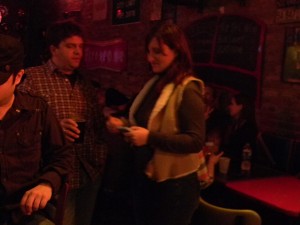 new friendships formed over lively conversation in this quaint setting. Shortly after 8 pm I made a few brief announcements before introducing the night’s guest speaker, A-list session bassist, Mike Chapman.
new friendships formed over lively conversation in this quaint setting. Shortly after 8 pm I made a few brief announcements before introducing the night’s guest speaker, A-list session bassist, Mike Chapman.
Mike’s talk centered on his lifelong career as a session player and he compared what he considers the key ingredients to being a successful studio musician to slices of a pizza.
The essential slices of the “session player pizza” include:
- Talent and Skill
- Positive Attitude
- Strong Work Ethic
- Flexibility
- Taste
In talking about the support role that musicians play on a recording, Mike commented “there’s a big difference between something that is fun to play, and something that is fun to listen to”, noting that they are not always the same thing. He also added that “musicians, both live and in the studio, are essentially in the service industry, and it’s our job to provide the window dressing to the song or artist”. Another point he couldn’t drive home hard enough was how essential it is to know “The Nashville Number System”, as this is the main way songs are charted in Nashville, again, both live and in the studio, and the book bearing the same title by Chas Williams is a great way to learn.
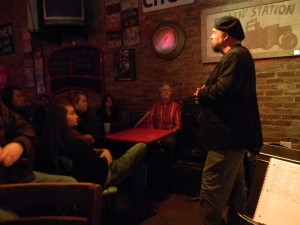 After Mike answered some questions from several alums it was time for some music. To get things started, I took the stage with our house band, consisting of Mike on bass and fellow alums, Heston Alley on Drums and Brian Lucas on Keys. We started out with a spirited version of Freddy King’s “Key to the Highway”, Paul Butterfield’s “Born in Chicago” (featuring bar owner, Patrick Weikenand on harp) and one of my favorites, “Ain’t Wasting Time No More”.
After Mike answered some questions from several alums it was time for some music. To get things started, I took the stage with our house band, consisting of Mike on bass and fellow alums, Heston Alley on Drums and Brian Lucas on Keys. We started out with a spirited version of Freddy King’s “Key to the Highway”, Paul Butterfield’s “Born in Chicago” (featuring bar owner, Patrick Weikenand on harp) and one of my favorites, “Ain’t Wasting Time No More”.
Our next grouping featured Ted Schemp on guitar and vocals and Elton Charles, a recent arrival to Nashville, on drums, and we played one of Ted’s originals followed by an instrumental blues jam. Sofia D got up and played some funky drums behind George Wong on bass and Ben Graves on guitar and vocals. Ben led us through a cool version of the Sam Cooke classic “Cupid” before Sarah Tollerson, host of another Alumni event, “Strength in Numbers” (held on the second Wednesday of each month at the Riverfront Tavern in downtown Nashville) joined us to sing “Oh Darlin’” and “You Make Me Feel like a Natural Woman”.
Michelle Lambert, another recent newcomer, brought charts for a couple of originals and delivered some emotive vocals interspersed with some fine fiddle playing to a couple of arrangements on the fly. Bassist, Keiffer Infantino got into the mix with another recent arrival, guitarist Rick Carrizales, and at this point Ben Graves came back up to play some sax. We played a funky jam in A minor and everybody got to stretch out before our final tune of “Freddy the Freeloader”, for which Mike Chapman got back up to finish the night.
If there’s one thing I have learned from all of the alumni events I have attended, it would be that Berklee alums are some of the nicest people you’ll ever meet. And that open, warm feeling was evident in both the conversations and music that took place on this cold February night. I would also add enthusiasm to this list of traits, as there was an infectious, electricity in the air during these performances.
This jam was our first of many to come, as this will be held on the first Tuesday of each month, and the Nashville Berklee Jam website will serve to keep alums informed about future jams and all of the upcoming Nashville alumni events. I would also like to encourage interactivity on this site, so don’t be afraid to post, comments, songs you would like to play or any other ideas you may have. On that note, I’m looking for volunteers to take photos and possibly shoot a few video clips of our next jam for future blogs.
Thanks again to all those who participated in making this night a great success and see y’all at the next one!
For those who are new to Nashville, or considering relocating to Music City, my book “The Nashville Musician’s Survival Guide” is a street level perspective of the music related jobs found here, and the ultimate companion for today’s musicians, songwriters and artists. Decades worth of information learned on the streets of Nashville for $20! How can you go wrong?
Have you ever played a gig that seemed to go on forever? I’m not talking about your typical three to four hour bar band performance that occasionally might drag a little in the middle, or some uninspired club gig full of “T n’ A” (tables and ashtrays). No, I’m talking about a gig that goes on for hours and hours, eight hours to be exact, by the end of which you felt like you aged 10 years. A few years back I did a few gigs like this, and lived to tell about it.
With thousands of singers and musicians trying to break into the Nashville nightclub scene and only so many potential gigs, the scene here can be quite competitive. And if you’ve been in Nashville for a while, you know all too well that these clubs are not known for their “great pay”. These two facts combined might cause some players to take on gigs that, in another part of the country, would be laughed 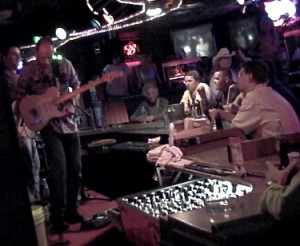 out the door.
out the door.
Don’t get me wrong; there are some club gigs around town that can be lucrative, a few even providing a guarantee of $100 or more per player. But most club gigs in Nashville are tips only, or provide a minimal base pay (usually $20-$50 per player), plus tips. So if you want to make some decent money, you really have to hustle.
Relying on tips causes many club bands to play a three to four hour shift without taking a break, and if a player needs to go to the bathroom the singer might do a few acoustic numbers to provide the band with at least one “pee break”. Relying so greatly on the tip jar for income also causes some singers and bands to exclusively cater to the tourists, choosing worn out dance floor classics like “Margaritaville”, “Sweet Home Alabama” and “Mustang Sally” to keep them happily bopping along.
Several years back I was working pretty steadily downtown, playing a lot of shifts at Tootsies, the Second Fiddle, and a few others on the strip. Around the same time there was another club just a few streets off of Broadway at which I also began performing (to save face, this club will remain anonymous, although its identity will be obvious to anyone who has ever worked this gig). For the purposes of this blog, I will refer to the club owner as “Harry” and the club as “Harry Houdini’s”.
I got to know Harry by hanging out at his club and sitting in on occasion. He liked my playing, and when the guitarist in his weekend house band quit, he offered me the spot. I was hungry for good paying work, and he offered to pay me $125 a night – straight pay with no tips. By Nashville standards, this was great pay for an in-town club gig. There was just one catch – the band was required to play from 7 PM to 3 AM. What?
“Don’t worry, I’ll give you plenty of breaks” Harry assured me. “You can even play sitting on a stool when you get tired”.
Like I said, good paying gigs are hard to find in Nashville, and at this point in time I really needed the dough. Besides, I had already experienced playing some “doubles” on Broadway (for those of you not in the know, this is two shifts back to back, with about a 30 minute break in between shows for change over). The doubles were hard work, but I had built up the necessary stamina, and the extra pay was helping. So what the hell, it can’t be much worse than a double, why not give it a shot?
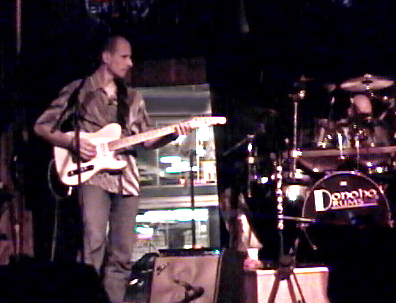 The day of my first gig at this fine establishment I arrived about 20 minutes early, loaded in my gear, and anxiously awaited downbeat. The group consisted of drums, bass, me on guitar, and a singer who also played acoustic. The song list was typical of downtown cover music – classic and new country, pop and rock, and for the first couple of hours, it seemed like just another typical bar gig in Nashville. I even got to take a short break around nine.
The day of my first gig at this fine establishment I arrived about 20 minutes early, loaded in my gear, and anxiously awaited downbeat. The group consisted of drums, bass, me on guitar, and a singer who also played acoustic. The song list was typical of downtown cover music – classic and new country, pop and rock, and for the first couple of hours, it seemed like just another typical bar gig in Nashville. I even got to take a short break around nine.
Then the dynamic of the night began to change. Harry, the club owner, was also a musician, and he came up and sang a set with the band. Some of the songs we played were the previously mentioned classics of “Margaritaville”, “Sweet Home”, and “Mustang Sally”, but we also added to the mix other worn-out wonders like “Brown Eyed Girl”, “Family Tradition”, and the often dreaded “You Never Even Called Me by My Name”.
It was a warm Friday night and the crowd, which seemed to be mainly tourists, seemed happy with what we were doing, we even got a dance floor going. The singer/owner finished his set and went back to work behind the bar, and the other singer came back to take over for a while. Another 45 minutes or so and we got our next pee break while the singer sang a couple tunes solo with his acoustic.
It was now after 11 o’clock, about the average length of a typical bar gig, and Harry again returned to the stage. To my surprise, this next set contained several of the same songs that we played in his first set, most of them being the aforementioned “classics”, a couple of which had also been covered by the other singer.
On our next pee break, sometime around 12:30 AM, I mentioned to the drummer something like “Boy he really likes those oldies. Does he always repeat those songs so much?”
“You ain’t seen nothin’ yet, we’re just getting started. Typically, he wants us to play Margaritaville, Sweet Home, Mustang Sally and Family Tradition about once an hour.” he said to my amazement. “His theory is that the tourists love these songs, and that with the high turnover, it doesn’t really matter how many times we play them.”
Ooookaaay.
Moments later I resumed my perch on the stage to continue my birds-eye view of this top 40 adventure, one that seemed to be entering some kind of classic-hit time warp. I remember looking up at the clock behind the bar a little while later and it reading something like 12:48. Except for the three or four 10 minute pee breaks, I had been playing this gig for about six hours, with two more hours to go, and it began to feel like I had been on the stage for days.
The crowd was now pretty thin, but we marched on. With Harry back on the mic, he asked the crowd “do we have any Lynyrds Skynyrd fans in the house?” With a couple of random cheers forthcoming, we launched into Sweet home Alabama again, now for the fifth time. The same thing happened with some of the other classics. I looked up at the clock a little while later and it was around 1:30. The more we kept repeating songs, the slower the clock seemed to move. At one point my mind flashed to the scene in the movie “Risky Business”, where the character played by Tom Cruise witnesses the clock going backwards right before the bell was supposed to ring.
By the end of the night, I was drenched in sweat and physically and mentally exhausted. My back was sore, my fingers shredded, and my mind numb. We had played Sweet Home Alabama, Mustang Sally, and Family Tradition seven times each throughout the night. Some of the other songs we played four to five times a piece. The funny thing was, the patrons never seemed to notice or care. Harry was right; there was a high turnover, and whatever crowd we had at any given moment seemed to enjoy the songs.
I collected my pay and went home, returning the next evening to do it all over again. As lucrative for an in-town gig as this was, I only lasted a few short weekends before moving onto something else. After a few years I was able to get over my “classic hits overdose”, but for the months following this episode, I suffered severe flashbacks every time somebody called out Sweet Home Alabama and Mustang Sally.
It was a warm summer afternoon in a small town in southern New Hampshire, back in the summer of ’79, and it had finally arrived. Summer vacation had just begun, and for this group of friends gathered around the family pool, the air was ripe with the kind of optimism and mystery that only a teenager can have – you know, that “anything can happen” feeling that occupies the youthful soul. Staring at the pool in cheerful content, they basked in the warmth of the sun while listening to the “Woodstock” soundtrack booming out a bedroom window. The youngest in this pack, a 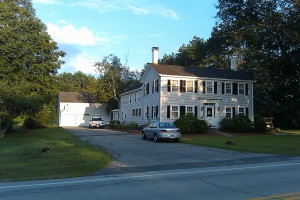 couple of eleven year old boys who were a few months away from starting junior high, seemed more than intrigued by some of these “new” electric sounds permeating this virgin summer air.
couple of eleven year old boys who were a few months away from starting junior high, seemed more than intrigued by some of these “new” electric sounds permeating this virgin summer air.
“What’s the name of this band?” asked one of the youths.
“That’s ‘Sly and the Family Stone”, answered Dave, the boyfriend of one of the younger lads’ older sisters.
“Wow, this is really cool!” the excited boy answered.
Up until this moment, these youngsters, like most pre-teens from this era, had been mostly hearing the corporate radio music of the day – a post-disco fallout period with bands and artists like E.L.O., Michael Jackson, and The Eagles providing a daily dose of saccharine for the masses – “Don’t bring me down…..Brrrruuucccce!”
“If you like Sly, you’re really going to love the last side of this record!” he confidently announced, and a short while later, everything changed.
It was as if a bomb had gone off – suddenly, the music coming out of the speakers sounded more like a science fiction movie soundtrack than it did the groovy “freedom rock” that had played just minutes before. Sounds that seemed to begin as single guitar notes ended as explosions – harmonic cascades and otherworldly sounds swirling into the stratosphere – “sheets of sound”. This music spoke of the epic joys and tragedies of the human struggle – war, hunger, love, peace, poverty, anarchy, inequality – it was all there, yet not a single lyric had been sung.
Near speechless, one of the 11 year olds turned to his friend and managed to say “this is amazing!”
“I thought you might like this” was the response, and they continued to marvel in the sonic wonderment, this new discovery rendering a near out of body experience.
With each passing moment came a new level of heightened awareness for the one boy in particular. It wasn’t as if he had never heard great music; many years before, his dad had turned him on to Santana, John Lee Hooker, and many other 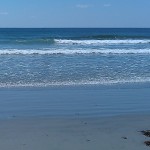 greats from the golden era of blues and rock. But this was different. This music transcended all of the traditional music forms that he had heard before. Melodically, it was free from the constraints of the pop song, or even blues format, yet it was bluesy. Rhythmically, it seemed connected to the earth in an intangible way, kind of tribal, with roots going deep into the African jungle. It was as if these sounds came right out of the sky, from the heavens, not a speaker in a window.
greats from the golden era of blues and rock. But this was different. This music transcended all of the traditional music forms that he had heard before. Melodically, it was free from the constraints of the pop song, or even blues format, yet it was bluesy. Rhythmically, it seemed connected to the earth in an intangible way, kind of tribal, with roots going deep into the African jungle. It was as if these sounds came right out of the sky, from the heavens, not a speaker in a window.
This music “spoke” to the young boy with a clarity he had not yet experienced in life, rendering this otherwise insignificant summer day the birth of the universe for him. It felt like a calling, like this was the day his life really began, the birth of an endless pursuit to the new sense of self and spirituality that permeated his being on that warm day in the sun long ago – like ocean waves meeting a sandcastle at high tide.
That was the day I first heard the music of Jimi Hendrix.
With my new book “The Nashville Musician’s Survival Guide” finally being out into the world, I’m starting to get my life back again. And going out on the town to network and check out the scene a little more often has now become a little more practical.
Around Town
Last Thursday I went to The Fillin’ Station, in Kingston Springs, for their weekly blues jam. There was a great turnout of talented players and some killer jams took place. For those of you who have never been, the jam is hosted by “The Mohawk Slim Blues Band” and runs every Thursday from 7 – 11 PM. A great place to meet new players, do a little jamming, or just hang that’s outside the in-town microscope – you owe it to yourself to check this place out!
This past Tuesday I went to The Fiddle and Steel Tuesday night jam. As some of you may have previously read, “The Steel” is a great in-town bar and a place that helped me get my start in Nashville. When I first moved to town, Tuesday nights at The Steel were THE place to be, as it was one of the best music industry hangs in the city for the longest time. In recent weeks the jam has been resurrected, and this was the first time I had a chance to check it out. The band started just after 10 PM and the place was packed by 11 PM, with a great turnout of players playing everything from Vince Gill to SRV and Merle Haggard to Jimi Hendrix. Toby Keith and some of his bandmates were hanging out for a bit and I saw several well-known Nashville songwriters there as well. It looks like Tuesday nights at The Steel are on again!
Nashville Musician’s Survival Guide News
Workshops
This coming Monday, August 29, I will be giving a talk about my book and my experiences in Nashville at Indie Connect. For those of you who are unfamiliar with this organization, Indie Connect is a community of independent musicians, singers, bands, songwriters, record labels, music professionals and service providers who come together to support each other by sharing ideas, expertise, contacts and resources.
Where: Indie Connect: 2720 Old Lebanon Rd. Ste.108, Nashville TN 37214
When: 12:00 PM – 2:00 PM
TV Appearances
Last week I was invited by Bryan Cummings to appear on “The Jesse Goldberg Show” on Channel 19, our local community access station. I will be talking about my book and my experiences in Nashville. I’ll post the air time at a later date.
Radio Giveaways
While I was at The Steel the other night I had the pleasure of meeting Darlas Rai, an on-air personality at Nashville’s 103WKDF. When she learned about my book, she offered to do some promotional giveaways on her radio show. During the next few weeks she will be giving away five free copies of my book during her nightly show which can be heard weeknights from 7:00 PM to 11:00 PM, and Saturdays 6:00 PM to 12:00 PM midnight. Listen to her show for details!
Reviews
And lastly, the book just received its first official review. The French country music magazine “No Fences” caught wind of the project and asked me to send a promotional copy for review. I don’t speak French, but judging from some comments in an e-mail from the magazine, the review is a good one. The review is posted here, and while I’m sure there are computer programs that can translate this, if anyone out there can translate this, please let me know via e-mail.
That’s about it for now; I’ve got some other interesting things in the works and will keep you posted. Meanwhile, happy jamming and I’ll talk to you later!
When we first began planning our New England visit, sometime late last year, I had the idea to put together a special reunion show, one at which we could reconnect with our dearest friends and musician buddies from days gone past. My initial thought was to throw together a band of players from my New England nightclub days, have a few guests sit in, and that a few of our old friends might turn up too. To my delight, all that happened, and then some.
Sometime around February I began putting this all together. The first thing I had to do was pick a place. Hmmm, early August in New England? What better place to do this sort of thing than Hampton Beach! And why not pick a venue in which I used to perform regularly back in my New England heyday, Wally’s Pub, which turned out turned to be the perfect spot. I would need a core band of players, so I contacted drummer, John Medeiros; and bassist, Keith Foley; both whom I once played with in my old band, Electric Blue. I wanted to have another guitar player involved as well, so I called up my friend, and former guitar student, Charles Cormier, who was a junior in high school when I left New England. Charles now plays with the seacoast jam band “Superfrog” from which I also recruited percussionist, Adams Viciguerra.
Once I had the place and the players, it was time to invite some special guests, and I began putting out some feelers months in advance. Putting together a reunion show from afar takes a lot of work, and I spent a lot of time e-mailing, talking on the phone, and sending mp3’s across cyberspace. It was all well worth the effort. On a warm Sunday afternoon a few days before the show, we had one rehearsal with the core band and, thanks to everyone doing their homework, things came together pretty quickly.
So Wednesday finally arrived, and the band guys arrived around 5:00 PM to set up and sound check. Our five piece ensemble was joined by, Jeff Bissonnette, a sound engineer that I knew from the “Jet City era”. We got everything dialed in and then our friends and guests began to trickle in. I hired a local videographer, Mike Maleszyk, to document the evening and he showed up about an hour before the show with one of his cohorts and three video cameras. A lot of friends that Kelly and I hadn’t seen in ages started arriving and I did my best to make some rounds before showtime. Some of these friends I hadn’t even seen since high school, some 25 years ago. There were so many people I wanted to talk to but so little time.
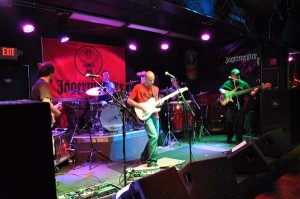
Charles Cormier, John Medeiros, Eric Normand, Adam Viciguerra, Keith Foley - photo credit Mike Maleszyk
Eight o’clock came around and it was time to get down and boogie. “The Eric Normand and Friends Band” felt good right off the bat and I was excited about the vibe we were putting forth. Despite the fact that I hadn’t played with any of these guys in a decade, and most of the players had never played together before, the group had a real synergy and maturity, almost as if we had been playing together for years. We played an hour-long set of my favorite tunes, blues-rock music born of another era. Songs by Freddy King, Delbert McClinton, Jimi Hendrix, and the Allman Brothers, got a good dance floor going by mid-set. A couple of high points came during our rendition of the classic “Sweet Melissa” and an extended version of “Little Wing”, the former turning out to be a particularly proud moment for me when Charles took a beautiful and emotive solo. This all crescendoed with the set’s climax of “Black Magic Woman”, complete with full blown Santana-style percussion and an extended outro jam that nobody wanted to end.
We took a break and I made a few rounds, trying to catch up with as many of my friends and musician buddies as I could. I didn’t get to talk to everybody (not for lack of trying) and I wish I could have had more time. It was time to kick off the second half of the night, and this began with a couple of songs with the core band plus friend and former Electric Blue member, Tom Martin sitting in on bass. Next would come a “Jupiter’s Ghost” reunion, and this was comprised of Doug Hinton on drums, Mark Gagnon on bass, Keith Bowen on vocals, and me on guitar. We played two songs in what felt like a literal time machine, a packed dance floor from the get-go. Keith stepped down and Brandon LePere joined us on vocals for the next onslaught. Once again it was “Sherman set the way-back machine”, and when I looked across the stage it felt like 1995 again. Once upon a time a lifetime ago, four guys had a little rock band called “Shockwave”, and we played, and played, and played. We went through a lot together, and many great memories and feelings came rushing back during this part of the night.
Next it was time for one last reunion grouping and the crowd heard the announcement “Will Stan Jackson and George Bisson please come to the stage”. Yes, that’s right a partial “Jet City” reunion was about to unfold. A little “Alice in Chains” followed by some “Bad Company” kept the dance floor hopping. Sadly, the night was drawing to a close, and I had the core band return for one final number, “Whipping Post”.
Have you ever experienced a moment in time that was so full of positive energy and wonderment that you hoped it would never end? An experience so pure and magical that you wish you could just live inside of that moment for eternity? For me, and maybe a few others on this particular night, this was one such moment. Life is whizzing by, and the perception of time seems to be changing, literally speeding up exponentially. This fact has recently clarified some things for me. Friends and family are of the best things in life, and to me, friends are family. The times we spend together make us who we are, and on this trip, reconnecting with the friends of our past was a powerful experience. So many people made this special night happen. People drove from as far away as Brattleboro, Vermont and Portland, Maine; Stan Jackson drove all the way up from Cape Cod to participate in this night. Thanks everybody for making it all come together!
The night did have to end, but the memories we made will last a lifetime. And besides, I don’t see any reason we can’t make this an annual event. Meanwhile, Kelly and I have adopted a new theme song, one from which I would like to appropriately quote for the end of this writing –
“Meanwhile I, ain’t wastin’ time no more,
Cause time goes by like hurricanes, and much faster things,
Don’t forget the pouring rain.”
I would like to send out a special thanks to Mike Maleszyk, Catherine Fraser-Dery, Athena Erickson, and Curt Comeau for the use of these photos.
